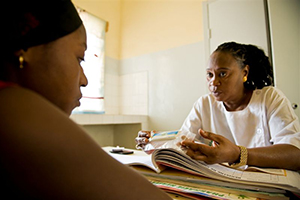
New Article in Global Health: Science and Practice Highlights Successful mLearning Pilot in Senegal
Technologists, public health officials, and educators have been talking for years of the promise of mobile technology to help improve the quality and cost-effectiveness of training health workers, particularly in countries hard hit with severe health workforce shortages. In these areas, training health workers without taking them away from their posts for lengthy in-service training sessions could allow for more frequent updating of skills without interrupting health care. However, research on the quality and acceptability of the training remains rare.
 A new article published in the June issue of Global Health Science and Practice highlights the results of an assessment CapacityPlus conducted in Senegal of a prototype mLearning system that uses interactive voice response (IVR) and text messaging on basic mobile phones. IVR allows trainees to respond to audio recordings using their telephone keypad. The pilot included offering a refresher training course on the management of contraceptive side effects and misconceptions to 20 public-sector nurses and midwives working in Mékhé and Tivaouane districts in the Thiès region.
A new article published in the June issue of Global Health Science and Practice highlights the results of an assessment CapacityPlus conducted in Senegal of a prototype mLearning system that uses interactive voice response (IVR) and text messaging on basic mobile phones. IVR allows trainees to respond to audio recordings using their telephone keypad. The pilot included offering a refresher training course on the management of contraceptive side effects and misconceptions to 20 public-sector nurses and midwives working in Mékhé and Tivaouane districts in the Thiès region.
The authors concluded that the mLearning system proved appropriate, feasible, and acceptable to trainees, and it was associated with sustained knowledge gains.
Access the article: Successful mLearning Pilot in Senegal: Delivering Family Planning Refresher Training Using Interactive Voice Response and SMS
Related items:
- New Publication Spotlight: Use of an Interactive Voice Response System to Deliver Refresher Training in Senegal
Photo by Clement Tardiff for IntraHealth International (health worker in Senegal discusses family planning options with a client)


